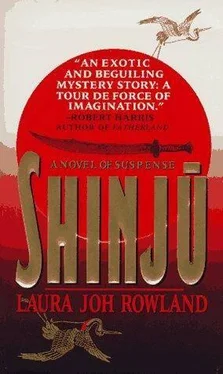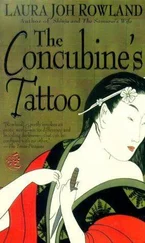Laura Rowland - Shinjū
Здесь есть возможность читать онлайн «Laura Rowland - Shinjū» весь текст электронной книги совершенно бесплатно (целиком полную версию без сокращений). В некоторых случаях можно слушать аудио, скачать через торрент в формате fb2 и присутствует краткое содержание. Жанр: Исторический детектив, на английском языке. Описание произведения, (предисловие) а так же отзывы посетителей доступны на портале библиотеки ЛибКат.
- Название:Shinjū
- Автор:
- Жанр:
- Год:неизвестен
- ISBN:нет данных
- Рейтинг книги:4 / 5. Голосов: 1
-
Избранное:Добавить в избранное
- Отзывы:
-
Ваша оценка:
- 80
- 1
- 2
- 3
- 4
- 5
Shinjū: краткое содержание, описание и аннотация
Предлагаем к чтению аннотацию, описание, краткое содержание или предисловие (зависит от того, что написал сам автор книги «Shinjū»). Если вы не нашли необходимую информацию о книге — напишите в комментариях, мы постараемся отыскать её.
Shinjū — читать онлайн бесплатно полную книгу (весь текст) целиком
Ниже представлен текст книги, разбитый по страницам. Система сохранения места последней прочитанной страницы, позволяет с удобством читать онлайн бесплатно книгу «Shinjū», без необходимости каждый раз заново искать на чём Вы остановились. Поставьте закладку, и сможете в любой момент перейти на страницу, на которой закончили чтение.
Интервал:
Закладка:
Sano walked to the front of the room and knelt behind the shirasu , a little shaken. Ogyu had just sentenced a man to death and his family to exile, but he was as calm as could be. Sano reminded himself that Ogyu had served as one of Edo ’s two magistrates for thirty years. He’d handled so many trials that he had grown inured to sights that would disturb others. He bowed deeply to Ogyu and said, “How may I serve you, Honorable Magistrate?”
Ogyu’s pale, spidery hands toyed with his magisterial seal, an oblong chunk of alabaster that bore the characters of his name and rank. His pinched face with its drooping eyelids gleamed sallow and sickly in the flickering lamplight, and his age-spotted bald pate looked like a diseased melon.
“Arson is a serious crime,” Ogyu murmured, studying the seal with elaborate concern. He paused, then added, “Though not an uncommon one.”
“Yes, Honorable Magistrate,” Sano answered, wondering why Ogyu had summoned him. Surely not to exchange trivialities. But Ogyu, like many other members of the refined upper classes, never came directly to the point. Kneeling in the Court of Justice, Sano felt as though he-or rather his powers of comprehension- were on trial.
“Such important but distasteful matters are best left to the devices of the lower classes. And one’s actions have a most unfortunate way of reflecting unfavorably on others.” Ogyu turned his head to gaze toward the north windows, in the direction of the castle.
Then Sano understood. Spies and informers abounded in Edo; they were part of an intelligence network that helped the shogun maintain the Tokugawas’ unchallenged control over the nation. Someone had undoubtedly begun reporting to Ogyu on Sano’s activities the day he assumed his position as yoriki . That someone must have been in the crowd at the site of the fire. And Ogyu had just told him that for a man of his rank to do doshin ’s work shamed the entire government, all the way up to the shogun. Although he didn’t want to contradict his superior, Sano felt compelled to defend himself.
“Honorable Magistrate, the doshin and his men would have arrested an innocent man if I hadn’t stopped them,” he said. “By questioning the witnesses, we got a description of the real arsonist, and-”
Ogyu lifted a finger, silencing Sano. The gesture came as close to an open rebuke as Sano had ever seen him make. But instead of speaking about the investigation, Ogyu changed the subject. “I had the privilege of taking tea with Katsuragawa Shundai yesterday.”
The syllables of the name fell over Sano like an iron blanket. All further protests died on his lips. Katsuragawa Shundai was his patron, the man who had gotten him this position.
During the civil wars of the last century, Sano’s great-grandfather, a vassal in the service of Lord Kū, had saved the life of a fellow soldier, head of the Katsuragawa family. The Katsuragawa fortunes had risen while the Sanos’ declined, but that act had bound the two families inextricably. Sano remembered the day when his father had called in that old debt…
His father had taken him to see Katsuragawa Shundai at the city treasury. Kneeling in Katsuragawa’s sumptuous office, they had accepted bowls of tea.
“I do not have much longer to live, Katsuragawa- san ,” his father said. “That is why I must request your assistance in the matter of my son. I have no fortune to leave him, and he is a mere tutor with no prospects and no special talents. But surely, with your influence…?”
Katsuragawa did not reply at once to the unspoken question. He lit his pipe, then cast a measuring glance at Sano. Finally he said, “I will see what I can do.”
Sano kept his eyes on his bowl. He hoped that Katsuragawa would do nothing, because he knew that his duty to his father required that he accept whatever was offered. However, he could live with the idea of benefiting from Katsuragawa’s patronage. In peacetime, samurai no longer made their fortunes by the sword. Their hope for success lay in getting a position in the government bureaucracy, through some combination of ability and connections. But he hated the thought of leaving his beloved profession for another that would suit him as little as he suited it.
Ogyu’s voice recalled Sano to the present. “I trust that we understand each other?”
“Yes, Honorable Magistrate,” Sano said heavily. Ogyu had reminded him of his obligation to his father and to Katsuragawa. To fulfill that obligation, he’d agreed to serve as a senior police commander when Ogyu, at Katsuragawa’s request, had offered him the post. It left no room for argument, independent action, or unconventional behavior. Duty, loyalty, and filial piety were the cardinal principles of Bushido-the Way of the Warrior-the strict code that governed a samurai’s conduct. His honor, highest and most important of all virtues, depended on his adherence to the code. And the military government Sano served valued conformity and obedience more than it did the pursuit of truth and justice, which were, by comparison, fluid and negotiable. Sano must defer to his superior’s desires at the expense of his own. He also felt deeply disgraced by Ogyu’s implied criticism. Never again would he venture out of the administrative district to investigate firsthand the cases that crossed his desk. From now on, those cases would remain words on paper. He bowed again, expecting Ogyu to dismiss him.
But Ogyu had not finished. “A small matter has come to my attention,” he said, “one that must be handled with the utmost discretion. You will do exactly as I say.”
His uncharacteristic directness piqued Sano’s curiosity.
“A fisherman pulled two bodies, a man and a woman, from the river this morning,” Ogyu continued. His small mouth pursed in disgust. “A shinjū .”
Sano’s curiosity grew. Double love suicides were almost as common as, and surely even more distasteful than, the fires that Ogyu had told him to leave to the doshin . Often lovers who couldn’t marry due to family opposition chose to die together in the hope that they might spend eternity in the Buddhist paradise. Why did Ogyu want to involve him in a petty shinjū ?
Ogyu gave him the answer to his unspoken question. “This was found on the woman’s body,” he said, taking a folded letter from his desk and offering it to Sano.
Rising, Sano crossed the shirasu and accepted the letter. The delicate rice paper crackled in his hands as he opened it and read the characters inked in a fine feminine hand.
Farewell to this world and to the night farewell
We who walk the path that leads to death-”
To what should it be compared?
To the frost by the road that leads to the graveyard
Vanishing with each step we take:
How sad is this dream of a dream!
Noriyoshi (artist) Niu Yukiko
Sano recognized the passage from a popular Kabuki play about a pair of doomed lovers. This was their final song before their death. Now he knew why Ogyu wanted him to handle the matter with discretion. The man, Noriyoshi, was a peasant, as the lack of a surname and the appendage of his profession made clear. A nobody. But Yukiko was daughter to Niu Masamune, lord of Satsuma and Osumi Provinces and one of the wealthiest, most powerful daimyo.
“I can see that you appreciate the delicacy of this situation,” Ogyu said. “Since the cause of death is obvious, you will dispense with the matter as quickly and quietly as possible. You will have Niu Yukiko’s body returned to her family, and inform your staff that anyone who publicizes her name or the circumstances of her death will meet with the most severe punishment.
“The man Noriyoshi, however… ” Ogyu picked up a brush and dipped it into his inkwell. “Noriyoshi shall suffer the full penalty dictated by the laws of the land. That will be all, Yoriki Sano.”
Читать дальшеИнтервал:
Закладка:
Похожие книги на «Shinjū»
Представляем Вашему вниманию похожие книги на «Shinjū» списком для выбора. Мы отобрали схожую по названию и смыслу литературу в надежде предоставить читателям больше вариантов отыскать новые, интересные, ещё непрочитанные произведения.
Обсуждение, отзывы о книге «Shinjū» и просто собственные мнения читателей. Оставьте ваши комментарии, напишите, что Вы думаете о произведении, его смысле или главных героях. Укажите что конкретно понравилось, а что нет, и почему Вы так считаете.












